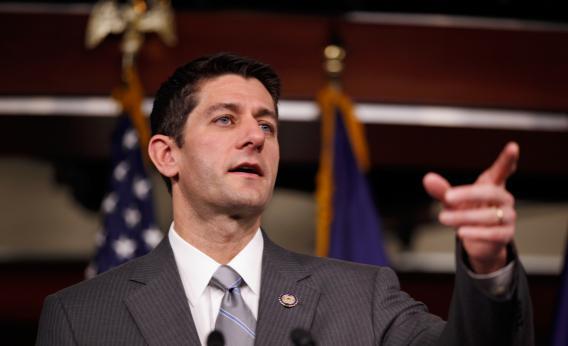House Budget Committee Chairman Paul Ryan has spent the better part of this month running a ballot-stuffing campaign to get Politifact to label Democratic claims that he wants to “end Medicare” labeled as their “lie of the year” and today he succeeded as Politifact beclowns itself:
But more often, Democrats and liberals overreached:
— They ignored the fact that the Ryan plan would not affect people currently in Medicare – or even the people 55 to 65 who would join the program in the next 10 years.
— They used harsh terms such as “end” and “kill” when the program would still exist, although in a privatized system.
— They used pictures and video of elderly people who clearly were too old to be affected by the Ryan plan. The DCCC video that aired four days after the vote featured an elderly man who had to take a job as a stripper to pay his medical bills.
Politifact’s first point is completely irrelevant to the issue at hand. It’s true that when Democrats said that Paul Ryan’s plan is a plan to end Medicare they didn’t emphasize the fact that it’s a plan to begin ending Medicare ten years in the future. But plans to end Medicare starting ten years from now are a subset of plans to end Medicare. The third point is baffling. Ryan’s plan would not impact people who are elderly today, but it would impact people below the age of 55 when they are elderly in the future. What kind of actors should be used to illustrate this point? Using a fifty year-old actor would be bizarre, as no fifty year-olds will suffer. The people who will suffer will be elderly at the time they suffer. A portrayal of elderly sufferers is more accurate than Politifact’s alternative.
The entire argument hinges on point two. House Republicans voted to replace Medicare’s existing single payer fee for service program with a different program, also called “Medicare,” under which (in the words of Politifact) retirees “would receive ‘premium support payments’ from the government to help pay for the private insurance.” Whether or not this change should be described with “harsh” terms is clearly a matter of ethical judgment. But it’s obviously a big change. Mitt Romney, for example, lauded the plan as reflecting “the need to fundamentally transform Medicare.” If friends of the plan describe it as fundamentally transforming the program, can it really be wildly illegitimate for its foes to describe it as ending Medicare? That doesn’t make sense to me. According to Mitt Romney, we’re fundamentally transforming Medicare. According to the DCCC we’re ending Medicare and replacing it with a fundamentally different program. This is a hair-splitting disagreement, not a gaping void of factual error and deliberate deception. The philosophy major in me will happily grant that Saul Kripke would agree with them, but I think their take on this (like Saul Kripke’s philosophy of language) flies in the face of common sense. Sensible people, following Wittgenstein, will hold that “Medicare” is a cluster concept and that whether or not a given transformation of the program is so fundamental as to constitute “ending” it is precisely what needs to be contested in the public arena.
